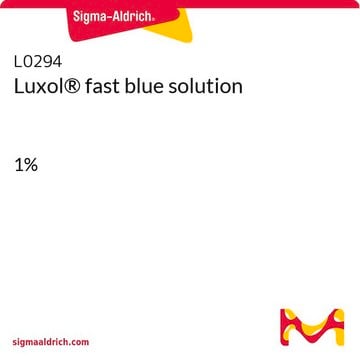44670
Fast Blue BB Salt hemi(zinc chloride) salt
for microscopy (Hist.)
Synonym(s):
4-Amino-2,5-diethoxybenzanilide diazotated zinc double salt, 4-Benzoylamino-2,5-diethoxybenzenediazonium chloride hemi(zinc chloride) salt
About This Item
Recommended Products
grade
for microscopy (Hist.)
form
powder
mp
157 °C
solubility
hot water: 0.01 g/10 mL
εmax
≥100 at 390-400 nm in water
≥200 at 325-335 nm in water
application(s)
diagnostic assay manufacturing
hematology
histology
storage temp.
room temp
SMILES string
[Cl-].[Cl-].Cl[Zn]Cl.CCOc1cc([N+]#N)c(OCC)cc1NC(=O)c2ccccc2.CCOc3cc([N+]#N)c(OCC)cc3NC(=O)c4ccccc4
InChI
1S/2C17H17N3O3.4ClH.Zn/c2*1-3-22-15-11-14(20-18)16(23-4-2)10-13(15)19-17(21)12-8-6-5-7-9-12;;;;;/h2*5-11H,3-4H2,1-2H3;4*1H;/q;;;;;;+2/p-2
InChI key
CMFRFQODFZBKTI-UHFFFAOYSA-L
Looking for similar products? Visit Product Comparison Guide
General description
Application
Signal Word
Warning
Hazard Statements
Precautionary Statements
Hazard Classifications
Acute Tox. 4 Oral
Storage Class Code
11 - Combustible Solids
WGK
WGK 3
Flash Point(F)
Not applicable
Flash Point(C)
Not applicable
Personal Protective Equipment
Certificates of Analysis (COA)
Search for Certificates of Analysis (COA) by entering the products Lot/Batch Number. Lot and Batch Numbers can be found on a product’s label following the words ‘Lot’ or ‘Batch’.
Already Own This Product?
Find documentation for the products that you have recently purchased in the Document Library.
Customers Also Viewed
Our team of scientists has experience in all areas of research including Life Science, Material Science, Chemical Synthesis, Chromatography, Analytical and many others.
Contact Technical Service














